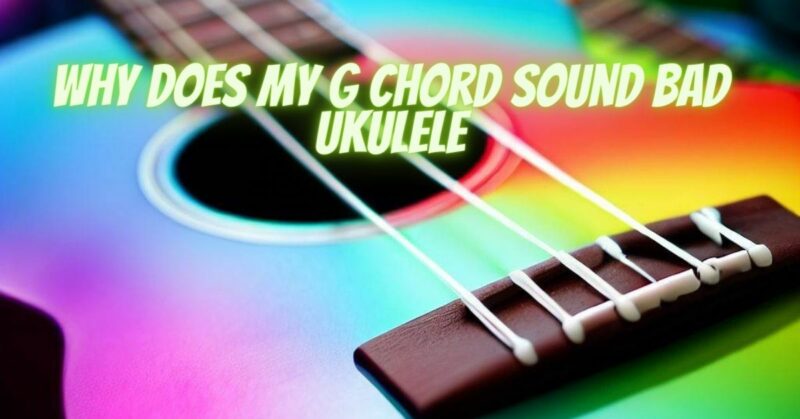As a ukulele player, encountering difficulties with certain chords can be frustrating, particularly when the G chord doesn’t sound quite right. A poorly sounding G chord can disrupt the harmony and overall musicality of your playing. In this guide, we’ll explore common reasons why your G chord may sound bad on the ukulele and provide insights on how to improve its sound. Let’s dive into the causes behind the problematic G chord and discover techniques to enhance its quality!
- Finger Placement and Technique:
Incorrect finger placement and poor finger positioning can greatly affect the sound of your G chord. Ensure that each finger is placed on the correct string and fret with enough pressure to produce clear notes. Strive to arch your fingers and avoid muting adjacent strings, as this can cause a dull or muffled sound. Take your time to position your fingers accurately and maintain proper technique while forming the G chord.
- Pressing Too Hard:
While applying adequate pressure is important, pressing the strings too hard can also negatively impact the sound of the G chord. Excessive pressure can bend the strings slightly, leading to an out-of-tune or distorted sound. Practice finding the right balance between pressing firmly enough to produce clear notes and not pressing excessively, allowing the strings to vibrate freely.
- Muted or Buzzing Strings:
Muted or buzzing strings can significantly affect the sound quality of the G chord. Check your finger placement to ensure that you are not unintentionally muting any strings with the underside of your fingers. Additionally, pay attention to your finger positioning behind the frets to avoid any buzzing caused by inadequate pressure or improper technique. Strive for clean and unhindered string vibrations.
- Ukulele Setup:
The setup of your ukulele can impact the sound of chords, including the G chord. If the action (string height) is too high or too low, it can make it difficult to fret the strings properly and produce a clean sound. Consult a professional luthier to assess your ukulele’s setup and make any necessary adjustments to optimize playability and sound quality.
- String Quality and Condition:
The quality and condition of your ukulele strings play a significant role in producing a good sound. Old or worn-out strings can sound dull and lifeless, impacting the quality of your chords, including the G chord. Consider replacing your strings with a fresh set of high-quality strings to enhance the overall sound and playability of your ukulele.
- Practicing and Muscle Memory:
It’s essential to remember that playing the G chord well requires practice and muscle memory. If you’re relatively new to the ukulele or transitioning to a different chord shape, it may take time for your fingers to develop the necessary strength and dexterity. Regular practice and consistent finger placement will help you improve the sound and accuracy of your G chord over time.
Conclusion:
If your G chord sounds bad on the ukulele, consider factors such as finger placement and technique, pressing too hard, muted or buzzing strings, ukulele setup, string quality and condition, and the importance of practice and muscle memory. By addressing these factors, you can improve the sound and playability of your G chord. Remember to be patient with yourself and allow time for your fingers to develop the necessary skills. With practice, precision, and attention to detail, you’ll be strumming a beautiful-sounding G chord on your ukulele in no time. Happy playing!

